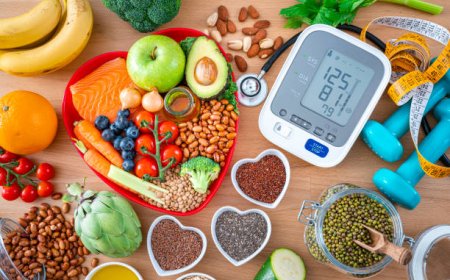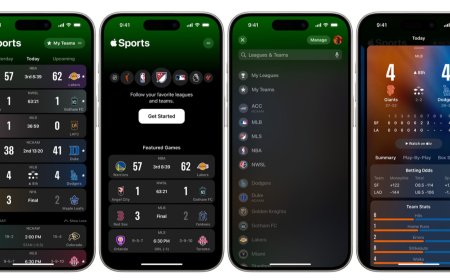Healthy Eating Tips for a Balanced Lifestyle in 2025
Discover essential healthy eating tips for maintaining a balanced diet, improving overall health, and boosting energy in 2025. Learn how to eat smarter with practical strategies.

Healthy Eating Tips for a Balanced Lifestyle in 2025
In today's fast-paced world, maintaining a healthy diet is essential to staying energized, focused, and feeling your best. Whether you're looking to lose weight, improve your overall health, or just feel more vibrant, healthy eating tips can make all the difference. This article will guide you through practical tips and strategies to incorporate healthy eating habits into your daily life, ensuring you can enjoy long-term health benefits.
What Is Healthy Eating?
Healthy eating is about making choices that provide your body with the nutrients it needs to function optimally. It involves consuming a balanced diet rich in whole foods, including vegetables, fruits, lean proteins, whole grains, and healthy fats. By eating nutrient-dense foods and avoiding processed, high-sugar, and high-fat options, you can support your physical and mental well-being.
1. Prioritize Whole Foods
When it comes to healthy eating, one of the most important tips is to focus on whole foods rather than processed or refined options. Whole foods like fresh fruits, vegetables, nuts, seeds, and whole grains are packed with essential vitamins, minerals, and fiber that nourish your body. These foods also tend to be lower in calories, which can support weight management.
Tip: Aim to fill half your plate with colorful vegetables and fruits at every meal to boost your nutrient intake.
2. Incorporate Lean Proteins
Protein is an essential nutrient that helps build and repair muscles, supports your immune system, and keeps you feeling full longer. Include lean protein sources such as chicken, turkey, fish, beans, and tofu in your diet. These options are lower in saturated fat and provide your body with the necessary building blocks for muscle and tissue health.
Tip: Try to have a source of lean protein at each meal to balance blood sugar levels and prevent mid-afternoon energy crashes.
3. Stay Hydrated
Hydration is key to overall health, yet many people forget to drink enough water throughout the day. Water plays a vital role in digestion, temperature regulation, and nutrient absorption. Aim to drink at least 8 glasses (64 ounces) of water per day. If you’re active, you may need more.
Tip: Carry a reusable water bottle and sip water regularly throughout the day to stay hydrated.
4. Limit Sugar and Refined Carbs
One of the most important healthy eating tips is to minimize the intake of added sugars and refined carbohydrates. These ingredients can lead to weight gain, energy crashes, and contribute to chronic diseases like diabetes and heart disease. Instead, opt for whole grains like quinoa, oats, and brown rice, which are rich in fiber and provide longer-lasting energy.
Tip: Choose natural sweeteners like honey or stevia in place of refined sugar, and avoid sugary beverages like soda and fruit juices.
5. Eat Healthy Fats
While fats have gotten a bad reputation in the past, they are essential for overall health. Healthy fats, such as those found in avocados, nuts, seeds, and olive oil, support brain function, reduce inflammation, and help maintain healthy skin and hair. Including moderate amounts of these fats in your diet can promote heart health and weight management.
Tip: Replace butter and processed oils with healthier fat options like olive oil or avocado oil for cooking.
6. Practice Portion Control
Eating healthy is not just about what you eat but also how much you eat. Portion control is crucial to maintaining a healthy weight and preventing overeating. Using smaller plates, avoiding distractions while eating, and listening to your body’s hunger cues can help you maintain healthy portion sizes.
Tip: Eat slowly and take time to enjoy your meal. It takes about 20 minutes for your body to register that it is full, so be mindful of your eating speed.
7. Plan Your Meals and Snacks
Meal planning is a key component of healthy eating. By preparing meals in advance, you’re less likely to reach for unhealthy options when you're hungry. Prepare balanced meals that include lean proteins, healthy fats, and fiber-rich carbs, and include healthy snacks like nuts, fruits, or Greek yogurt to keep hunger at bay between meals.
Tip: Spend a few hours each week preparing meals and snacks, and store them in portioned containers for easy access.
8. Limit Processed Foods
Processed foods, especially those high in sodium, artificial preservatives, and unhealthy fats, can negatively impact your health. These foods often lack essential nutrients and are linked to chronic conditions like hypertension, obesity, and heart disease. Focus on cooking with fresh ingredients and limit takeout or pre-packaged meals.
Tip: Check the ingredients list on packaged foods and avoid items with added sugars, artificial flavors, and long lists of unrecognizable ingredients.
9. Incorporate Fiber-Rich Foods
Fiber is vital for digestive health and helps you feel full longer. Eating a diet high in fiber can prevent constipation, lower cholesterol levels, and regulate blood sugar levels. High-fiber foods include vegetables, fruits, legumes, and whole grains.
Tip: Include a variety of fiber-rich foods in your meals to support healthy digestion and keep your energy levels stable.
10. Be Consistent
Healthy eating is not about quick fixes or short-term diets. It’s about creating sustainable habits that nourish your body in the long term. Consistency is key to reaping the benefits of a healthy diet. Start small by making one or two changes to your eating habits and gradually build upon them over time.
Tip: Set realistic goals for your healthy eating journey and celebrate small successes along the way.
Conclusion
Eating healthy is a lifestyle choice that requires commitment and conscious effort. By focusing on whole, nutrient-dense foods, staying hydrated, and practicing portion control, you can support your overall health and well-being. Start implementing these healthy eating tips today, and watch your energy levels, mood, and overall health improve in 2025 and beyond.
Call to Action: Want more tips on maintaining a healthy lifestyle? Subscribe to our newsletter for weekly updates on health, nutrition, and wellness trends.
What's Your Reaction?






















































